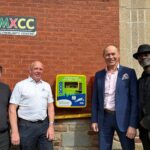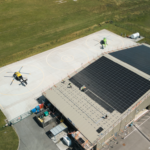
Does your community need a public access defibrillator?
July 18, 2024
Rooftop solar panels help GWAAC generate renewable energy and cut costs
August 1, 2024On 5 December 2020, Claire Harris, an IT Business Analyst from Chippenham, suffered a sudden cardiac arrest (SCA) at home. With no history of heart problems, Claire’s world was suddenly turned upside down. Over three years on, Claire and her husband Martin are coming to terms with what happened that night and they feel lucky that the right people were able to help at the right time.
Memories of the day
Claire has very little memory about the day or the ones leading up to it. She vaguely remembers going to the doctor’s surgery in the morning to have her annual flu vaccine.
Martin said that as the day wore on, Claire started to feel light-headed and her heart was racing. By the time they settled down to enjoy a takeaway and watch the Sakhir Grand Prix qualifying she was feeling very tired and didn’t want anything to eat. They went up to bed at around 22:15.
Martin said, “When I finished reading, I switched the light out and thought something didn’t sound right in the way Claire was breathing or not breathing. She just sounded different. I spoke to Claire and got no response. I shook her. Nothing. I put her in the recovery position.”
Martin called 999 at 22:54.
The 999 call handler asked, “Is she breathing?”
Claire wasn’t breathing and she had turned blue. The call handler instructed Martin to get her out of bed and onto the floor.
With some previous first aid training and with the call handler talking him through what to do, Martin delivered cardiopulmonary resuscitation (CPR) to Claire in a desperate attempt to keep her alive.
A few minutes later, paramedics banged on the front door; luckily for Claire, they had been less than half a mile away. After several more minutes of CPR and two shocks from a defibrillator, the paramedics got Claire’s heart restarted at 23:06.
Meanwhile, Great Western Air Ambulance Charity’s (GWAAC) specialist crew had been dispatched; Critical Care Doctor, Tim Godfrey, and Specialist Paramedic in Critical Care (SPCC), Dee Dale, rushed to the scene from the airbase in Almondsbury in one of GWAAC’s fully-equipped emergency response vehicles.
On arrival, Dr Tim and SPCC Dee quickly got to work. Dr Tim got the specialist equipment ready to anaesthetise Claire (they needed to protect her brain from any further damage caused by a lack of oxygen from the SCA) and SPCC Dee went upstairs to Claire.
Claire had to be brought downstairs so the GWAAC crew could intubate her, put her into an induced coma and move her into the back of a land ambulance. The Fire Service helped with this. Martin said, “They had to cut some of the banisters away so Claire could be taken down the stairs on a stretcher.” He remembers, “We’d gone from having no one in the house for months (it was the COVID-19 lockdown) to suddenly having a house full. It felt strange and chaotic but everyone worked well together!”
“My biggest memory was what GWAAC did outside on the road”
Once outside, the GWAAC team anaesthetised Claire in sub-zero temperatures. Martin said, “They got the floodlights out, in the street, in the freezing cold. There was no panic from any of them. From the moment the emergency services arrived, they took over from me and kept me away from the bad side of it but kept me updated; there was care for me.”
Martin was impressed by how everyone communicated with each other: “There was lots of talking to each other for an hour and a half – all parties – it felt like there was a procedural method of doing things; there were breaks with CPR, people taking over. They all worked in unison even though they might not have worked together before. It was people doing what they needed to do and what they were best equipped to do. It was trust and co-working in motion. The communications were spot on.”
Dr Tim and SPCC Dee decided that Claire needed to go to the Bristol Heart Institute for her ongoing specialist care, rather than the nearest hospital. Dr Tim went with her in the ambulance. Thanks to the actions of the teams that helped her that night, Claire had been given a chance of survival.
While treatment continued for Claire in hospital, Martin had to stay at home and wait for a call. The COVID-19 pandemic meant he couldn’t go with Claire. “That was hard,” he said. “I received two calls in the early hours of the morning from the Emergency Department saying they didn’t know if Claire would survive.”
A rollercoaster of recovery
Claire spent four weeks in hospital. It was touch-and-go for a few days and doctors were concerned about how well she might recover. They had trouble bringing her out of the medically induced coma and had to put her back under. She finally came out of her coma eight days later and then a couple of days after that Claire contracted MRSA (Methicillin-resistant Staphylococcus aureus — a bacteria that causes infections in different parts of the body.)
Claire eventually had her S-ICD (internal defibrillator) fitted on New Year’s Eve; she was discharged on 2 January 2021.
Her recovery at home was thwarted with setbacks and Claire ended up having a further operation towards the end of February. After this, she began to recover quite quickly physically, but the emotional recovery was much harder for both of them.
Claire said, “One thing that was difficult to navigate was that we were both involved in the same event and both suffered trauma from it, but our experiences were very different and how we’ve dealt with it has been very different — especially as I have no memory of the cardiac arrest and Martin was unable to see me in hospital due to Covid restrictions. I think we’ve both been trying to protect the other person to each other’s detriment. It’s been quite a strain on us both. One event. Two different experiences. Both impactful. We’ll never know what each other really went through.”
It has also been hard not knowing what caused Claire’s cardiac arrest. Despite lots of tests she is no further forward and is coming to terms with the fact she might never know.
Meeting the GWAAC doctor who helped save her life
When Claire joined a Facebook group for the Sudden Cardiac Arrest UK Charity; other members said how beneficial it had been to contact the air ambulance who helped them.
“I needed time to process what had happened to us. When the time was right, when I was in a better place, I was ready to meet Dr Tim to say thank you and to hear his side of the story. But I wasn’t sure whether I should get in touch. I thought, do they really want to meet me?”
GWAAC’s Supporter Engagement Coordinator, Philippa, helped arrange for Claire and Martin to visit the airbase and meet Dr Tim.
Claire says, “The visit to GWAAC kick-started the healing process. Talking to GWAAC and Dr Tim has helped us to come to terms with everything. And for Martin, who has struggled to talk about it more than me, now finds it easier to do. We’d like to get across this message to others in similar circumstances and particularly men — talk about it. It really does help! And talking together has helped us understand what the other experienced and helped fill some of the many gaps in my memory.”
Reflecting on her situation now, Claire said, “We’ve come a long way and we’re on the mend. We’re learning to accept what’s happened and if it happens again, I have a device to fix it.”
“Being able to say thank you to people and raise awareness is really important!”
Claire said, “When we visited GWAAC’s airbase, Dr Tim said that because much of what they deal with is negative, a positive outcome is really nice for them to hear about. I didn’t think about it from their point of view. If there’s something I can do for GWAAC, having benefitted from the service, I gladly would. But I hadn’t thought about it the other way around; what it’s like for the crew. So I’d like to encourage other former patients to get in touch too.”
She felt it was important to share her story because: “I am an example that an SCA can happen to anyone and I want to raise awareness of the important work that GWAAC does and the chain of survival that is needed to give someone the best outcome.”
Claire realises that she was extremely lucky: “Martin noticing something was wrong, calling 999, doing CPR and the rapid response and the amazing care of the paramedics, GWAAC crew and hospital staff means that I am alive today.”
Life now for Claire and Martin
Claire’s cardiac arrest made her evaluate life and decide what is and isn’t important. She decided to take early retirement, get a dog and volunteer with Martin for their local National Trust Property, Lacock Abbey.
Claire and Martin are also active members of Bath Motor Club of which GWAAC is a charity partner. Claire said, “We never thought we would need GWAAC’s services, and if we did, we assumed it would be for a car crash somewhere, not something in my own home. GWAAC is not some distant charity, it’s a local one and it’s there for anyone, not a certain demographic.”
Claire’s parting message for anyone reading her story is, “Learn CPR, it only takes a few minutes, and find out where your nearest defibrillator is. This could save a life.”
“There was lots of talking to each other for an hour and a half – all parties – it felt like there was a procedural method of doing things; there were breaks with CPR, people taking over. They all worked in unison even though they might not have worked together before. It was people doing what they needed to do and what they were best equipped to do. It was trust and co-working in motion. The communications were spot on.”






